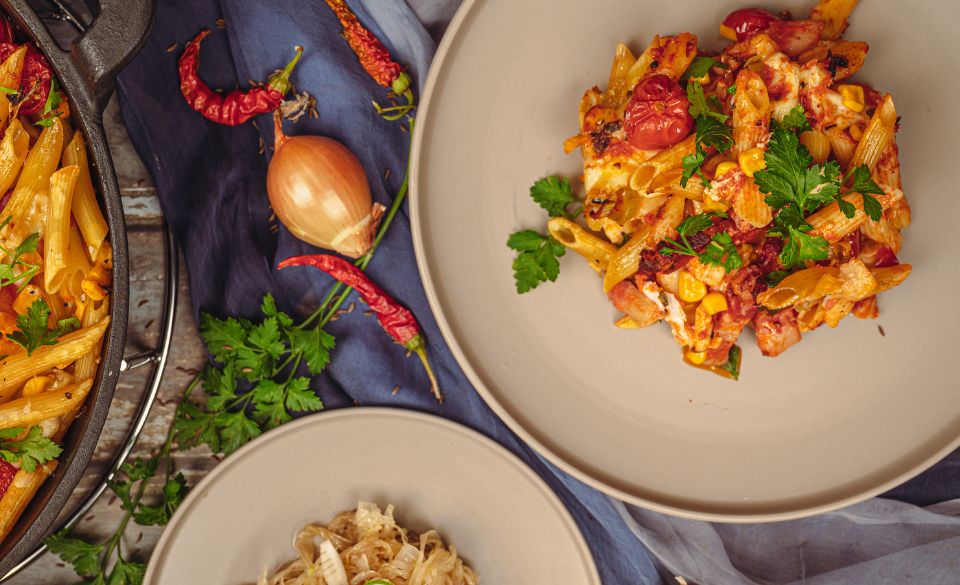
Why Do Runners Eat Pasta In Training And Before Races?
Page Contents
- What Are The Benefits Of Eating Pasta Before A Race Or Training Session
- How Much Pasta Should You Eat Before A Race Or Training Session
- What Are Some Good Recipes For Pre-race Or Pre-training Pasta Dishes
- Can You Eat Too Much Pasta Before A Race Or Training Session
- Are There Any Other Foods That Runners Can Eat To Boost Their Performance
- How Do You Know If You’re Eating Enough Carbohydrates When Running
If you’re a runner, you’ve probably heard that eating pasta before races and during training can help improve your performance. But what’s the science behind this? And is there any benefit to eating pasta? In this blog post, we’ll take a look at some of the research on this topic and discuss:
1. What are the benefits of eating pasta before a race or training session
2. How much pasta should you eat before a race or training session
3. What are some good recipes for pre-race or pre-training pasta dishes
4. Can you eat too much pasta before a race or training session
5. Are there any other foods that runners can eat to boost their performance
6. How do you know if you’re eating enough carbohydrates when running
What Are The Benefits Of Eating Pasta Before A Race Or Training Session
Eating pasta before a running race or training session can provide some benefits. The carbohydrates in pasta can help to give you sustained energy during your run. Pasta also has a relatively low glycemic index, which means it won’t cause spikes in your blood sugar levels that could lead to a crash later on.
In addition, eating pasta can help you to top off your glycogen stores. Glycogen is the stored form of carbohydrate that your body uses for energy. When you run, your body draws on glycogen for energy. If you haven’t eaten enough carbohydrates leading up to your run, your glycogen levels may be too low, which can lead to fatigue and poor performance.
So if you’re looking for a pre-run meal that will give you sustained energy and help top off your glycogen stores, pasta is a good option. Just be sure to pair it with some protein to help slow down the digestion process and keep you feeling satisfied until race time.
How Much Pasta Should You Eat Before A Race Or Training Session
If you’re carb loading before a big race or training session, how much pasta should you eat? It turns out, there’s no one-size-fits-all answer.
The amount of pasta you should eat before running depends on a few factors, including your weight, the distance you’re running, and how your body responds to carbs.
Here’s a general guide:
– For runners who weigh less than 130 pounds: 1 to 1.5 grams of carbs per pound of body weight
– For runners who weigh between 130 and 150 pounds: 1.2 to 1.7 grams of carbs per pound of body weight
– For runners who weigh more than 150 pounds: 1.5 to 2 grams of carbs per pound of body weight
These recommendations are based on the idea that you should consume about 30 to 60 grams of carbs per hour during endurance exercise.
If you’re new to carb loading, start with the lower end of the range and see how your body responds. You might need to experiment a bit to find what works for you. And remember, it’s not just about the quantity of carbs you eat, but also the quality. Choose complex carbs like whole-grain pasta, brown rice, or quinoa over simple sugars.
Bottom line: there’s no need to go overboard when carb loading. A moderate amount of pasta (1 to 1.5 grams of carbs per pound of body weight) is all you need to give your body the energy it needs to perform at its best.
What Are Some Good Recipes For Pre-race Or Pre-training Pasta Dishes
There are a few key things to keep in mind when preparing pasta dishes for pre-race or pre-training meals. First, you’ll want to make sure the pasta is cooked al dente, as this will help it to digest more easily. Second, you’ll want to avoid heavy sauces or toppings, as these can upset your stomach during your event. Finally, it’s important to choose simple recipes that you know you’ll enjoy eating – after all if you don’t like the dish, you’re not likely to stick with it!
With those guidelines in mind, here are some delicious and easy recipes for pre-race or pre-training pasta dishes:
1. Spaghetti with Tomato Sauce – This classic dish is always a hit, and it’s easy to make ahead of time. Just cook the spaghetti al dente, then top with your favorite tomato sauce.
2. Fettuccine Alfredo – Another classic pasta dish, fettuccine Alfredo is rich and creamy without being too heavy. It’s also easy to make ahead of time, so you can simply reheat it before your event.
3. Penne with Pesto – This dish is light and flavorful, and it comes together quickly. Just cook the penne al dente, then mix it with your favorite pesto sauce.
4. Spaghetti with Olive Oil and Garlic – This simple dish is full of flavor, and it’s perfect for pre-race or pre-training meals. Just cook the spaghetti al dente, then mix with olive oil and garlic.
Whether you’re looking for something simple or something more elaborate, these recipes will help you fuel up for your next event.
Can You Eat Too Much Pasta Before A Race Or Training Session
Many runners believe that eating pasta before a race or training session will give them an edge. After all, pasta is packed with complex carbohydrates, which are essential for sustained energy levels. However, it is possible to eat too much pasta before running. Eating a large amount of pasta can lead to gastrointestinal issues like bloating and diarrhea. It can also cause blood sugar spikes and crashes, leading to fatigue and poor performance. If you’re going to eat pasta before running, do so in moderation. Stick to a small portion size and pair it with other healthy foods like lean protein and vegetables. And always make sure to hydrate properly before hitting the road or trail!
Are There Any Other Foods That Runners Can Eat To Boost Their Performance
There are plenty of foods that runners can eat to give them a performance boost. Here are some of the best options:
1. Bananas
Bananas are a great source of potassium, which is an electrolyte that helps to regulate muscle contractions. This means that it can help to prevent cramping, and also improve your overall endurance.
2. Beetroot juice
Beetroot juice is rich in nitrates, which have been shown to improve blood flow and oxygen delivery to muscles. This can lead to increased stamina and improved performance.
3. Quinoa
Quinoa is a nutrient-rich grain that provides slow-releasing carbohydrates, as well as protein and fiber. This makes it an ideal food for runners, as it can help to sustain energy levels throughout a long run or race.
4. Sweet potatoes
Sweet potatoes are another excellent source of slow-releasing carbohydrates. They also contain vitamins and minerals that can support immune function and help to reduce inflammation.
6. Greek yogurt
Greek yogurt is a good source of protein and calcium. It can also help to settle the stomach before a run, and provide a quick source of energy during or after exercise.
How Do You Know If You’re Eating Enough Carbohydrates When Running
How do you know if you’re eating enough carbohydrates when running? The answer may not be as simple as you think.
There are a few things to consider when trying to determine how many carbs to consume while running. First, the type of carbohydrate is important. Second, the amount and timing of carbohydrate consumption can make a difference. And finally, every runner is different and will need to experiment to find out what works best for them.
When it comes to types of carbohydrates, complex carbs are generally better than simple carbs. Complex carbs take longer to digest and provide a more sustained energy release. Simple carbs are quickly absorbed and can cause spikes in blood sugar levels.
The amount of carbohydrates you need will also depend on how long you’ll be running. For runs lasting longer than 90 minutes, it’s important to consume additional carbs to maintain energy levels. And for very long runs, like marathon training runs or races, carbo-loading the night before can be beneficial.
Timing is also important when it comes to carb consumption. If you’re running a race that’s less than an hour, you don’t need to worry about consuming large amounts of carbs before the run. However, for longer runs, taking in more carbohydrates before and during your run can help improve performance.
Finally, every runner is different and will need to experiment to find out what works best for them in terms of carbohydrate intake. Some runners may do fine with just water while others may need energy gels



